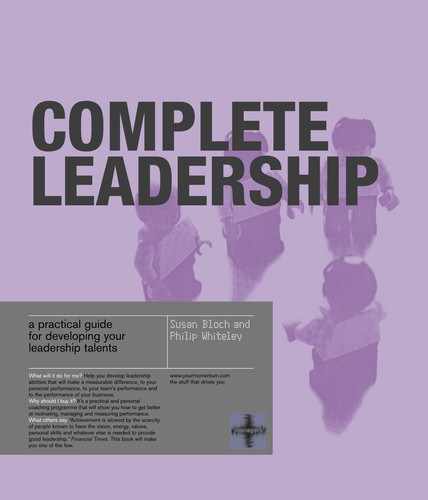
momentum complete leadership chapter seven
135
pages 134 /
chapter seven
measuring your progress
momentum complete leadership chapter seven
135
pages 134 /

How can you measure leadership performance? Why should you do
it?
Let’s explore the second question first. It may seem illogical to
attempt precise measures of an intangible matter such as the diverse,
complex and subtle skills of a modern business leader.
We invert the onus. Your personal development is integral to your
success and that of your organization. It should not be done in an
amateurish or ‘cross-fingers-and-hope’ manner. There is not a good
reason for not checking whether the sometimes expensive and time-
consuming interventions are having a positive effect.
Learning points from this chapter
◆ There is not a good reason for not checking your
effectiveness.
◆ Precise measures on many aspects of leadership are not
possible; but it is still better to have some indicators.
◆ The measures are straightforward; give graphic indication of
relative progress, and can be incorporated into continual
communication and team development.
◆ External measures of technical skills of team members can
be useful as a team building exercise.
Organizations have traditionally not measured whether the return
they obtain from their investments in training and development of
managers (or anyone else, for that matter) is worthwhile. This is not
a sustainable attitude. The vast bulk of the assets of a modern
organization are its people, networks, skills, intellectual networks
and organizational knowledge. The bulk of its meaningful
investment will be on people. It is not logical for this to be made in
an unplanned way.
Spending on the personal development of leaders can be
considerable. Some form of measures, both collective and individual,
will be needed. On personal development, we can’t pretend that we
can put precise figures to everything; the point is to have a reliable,
relative measure of progress, by keeping the evaluation process
consistent. This leads us on to the ‘how’.
The process that we have explored of developing self-awareness by
comparing your perception of yourself with how you come across to
others, is not a one-off. Development is a continual process.
There is little point in going through this process unless you have
improved; and you need to find out if you have improved. So you
can repeat the questionnaires (pages 69 and 71) after, say, six months
or a year – and see if the scores you give yourself are closer to those
your team give you, and whether you have improved on a key style
that required improvement, be it the authoritative or the democratic
style.
This is a relative, subjective measure, but it is perfectly valid,
because it’s the relative, subjective experience of your leadership that
determines the motivation of your team or organization, which in
turn determines whether your customers buy from you. It’s the
measure that matters. So if you had rated yourself as eight out of
ten on the democratic style, but were only given three out of ten by
your employees, a good measure is whether the employee rating
had improved after your commitment to involve them more in
decisions.
momentum complete leadership chapter seven
137
pages 136 /
..................Content has been hidden....................
You can't read the all page of ebook, please click here login for view all page.
